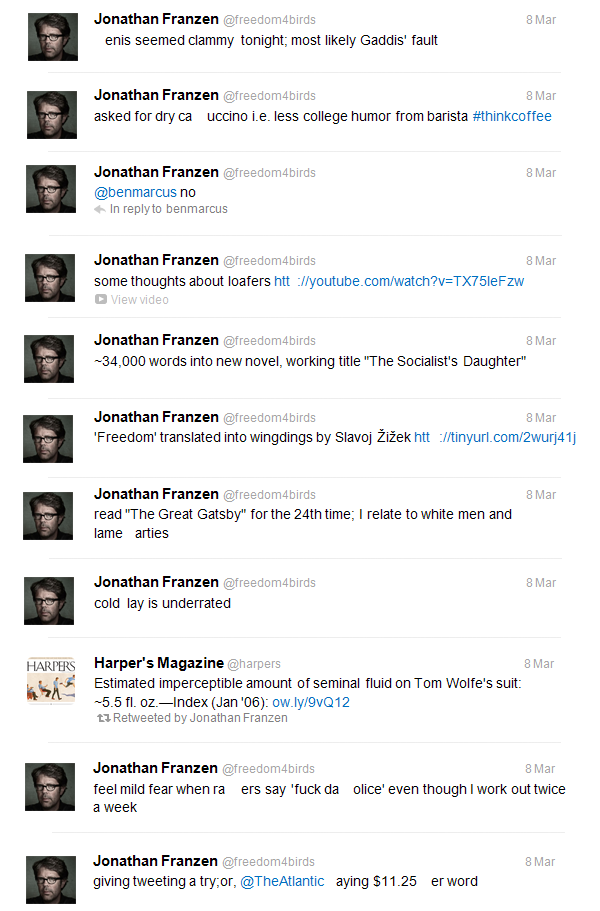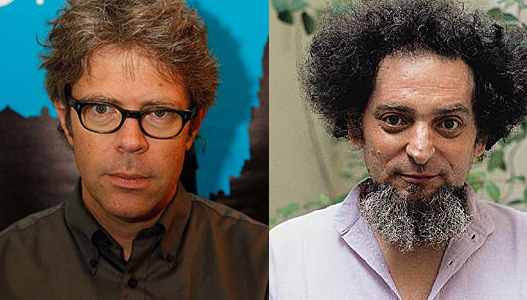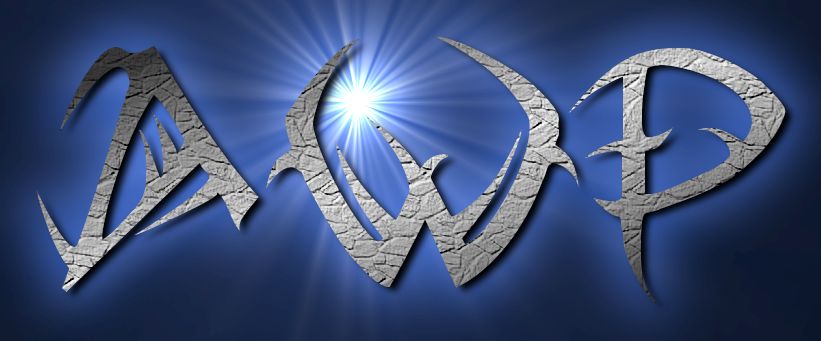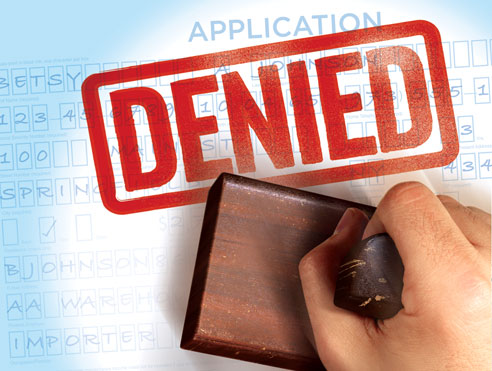A film I never saw
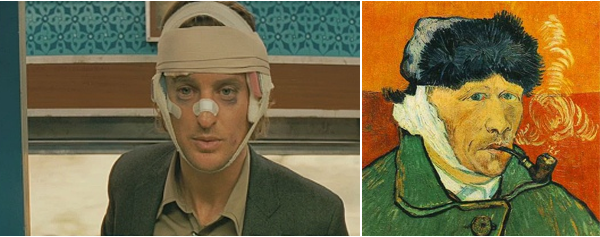
On August 26, 2007, Owen Wilson was taken to a hospital in Santa Monica, California, after slashing his wrists in a suicide attempt. A friend tells People magazine “he almost did not make it”; that Wilson’s near fatality was reduced to a cliché in a glossy may be the reason why he questioned his life, or we might question ours. Wilson had also recently broken up with Kate Hudson, so she may consider herself flattered. The truth is we will never know what went on in the mind of a made man. The money and success just not enough. Months later, The Darjeeling Limited (2007) was released, in which Wilson — his character having just suffered a horrible motorcycle accident — is seen ineffectively wearing a bunch of gauze. He and his brothers went to find their father; not his corpse, but emotional legacy. Owen’s real life brother Luke Wilson has his own suicide scene in The Royal Tennenbaums, his wrists streaming blood over curly locks of cut hair in Starry Night blue. On December 23, 1889, Vincent Van Gogh cuts off his ear (or merely the lobe, he claims) in a brothel, and hands it to a prostitute for safe keeping; Gauguin is to find him later on that night in his bed covered in blood. Some art historians propose that it was actually Gauguin who did it during a heated argument; others say it was Van Gogh’s clingy response to Theo (his brother and sole patron) getting engaged. To others, simply a bad night with a hooker. The truth is we will never know what went on in the mind of a mad man. In another similar self-portrait painted presumably that week, or even day, for he wears the same outfit, a Japanese print on the wall behind him shows two mothers and their children situated immediately next to his good ear, whispering over waves.
“Aaliyah would have been on Twitter. It is fucked up that she is dead.”: An Interview with Patricia Lockwood, Poet Laureate of Twitter

Patricia Lockwood is a poet. (A poet. A very good poet.) She also uses Twitter in interesting ways. Earlier this year, her series of SEXTS got attention from Rhizome, and then The Huffington Post & The New Yorker.
And I look at those tweets and I wonder, “How does someone do that?” Not get attention, though. I mean write those. How? So I asked.
***
So, I was initially pretty dismissive of Twitter. And then, at some point, I noticed how funny it could be and found it to be a mostly worthwhile distraction. And then—probably while reading the fake Christopher Walken feed—I began to think there could be something kind of poetic about Twitter. That each little update could be a joke, a persona poem, a zen koan.
Did you sense the “poetic” potential in the Twitter post from the beginning or did your approach to Twitter change?
It took me about ten years to join Twitter because, like old men everywhere, I “did not get it.” What is the … where are your mentions … what is hashtag … who is a belieber? When I did join, I spent my first week livetweeting the movie Bambi, focusing specifically on the puberty of Bambi and Thumper, and was subsequently unfollowed with extreme prejudice by the few poets who had charitably followed me in the first place. (This still happens! A real writer will follow me and then four days later be like “what the freak is this” and it is goodbye. CAN’T believe you wrote a tweet about Jesus jelqing.)
OK, so scrolling back, I see that one of my earliest tweets was “I want to see the Beethoven movie where Beethoven finally manages to tear his way out of the dog’s body and play something good on the piano.” About two weeks later I sexted for the first time, like a teen. So it wasn’t so much that I saw the possibilities right away as that … Twitter is the perfect way to disseminate the kind of writing that comes most naturally to me.
READ MORE >
#THINGSIDIDNTTWEETATAWP
These are things I didn’t tweet while walking around AWP like a zombie (typos included):
The Higgs-Jameson Experimental Fiction Debate, part 2

CH: Now then, while your definition (in Part 1) is certainly more elegant than mine in its brevity, it seems problematic to me in terms of its three main assumptions: unfamiliarity, the dominant, and schism.
Jakobson’s idea of the dominant, for example, seems patently antithetical to experimental literature because it supposes an integrity of structure that I’d classify as akin more to orthodoxy than heterodoxy. In other words, “a focusing component” tends not to be an attribute of experimental literature; in fact, it seems to me that the comportment of experimental literature stems from a distaste or distrust or disinclination toward such a notion.
ADJ: That’s a fair point, although I think even experimental fiction has its organizing principles. There are always some things the artist wants to do, and other things he or she doesn’t want to do—even if that changes from section to section, or moment to moment. The dominant is simply a record of those desires—and note that my definition does not require them to be conventional.
Would you say, then, that experimental fiction lacks any and all convention? Any and all integrity in its structure? And, if so, can you give examples of such texts (fiction that lacks any and all convention, any and all structural integrity)?
NEA slams BlazeVOX authors
This letter just came from the NEA to a BlazeVOX author:
Dear XXX:
It has come to our attention that BlazeVOX books has asked authors to contribute to the cost of publishing their own books.
The eligibility requirements for the NEA’s Creative Writing Fellowships prohibit applicants from using publications from presses that require individual writers to pay for part or all of the publication costs (http://www.arts.gov/grants/apply/Lit/eligibility.html).
Therefore, you may not use a book published BlazeVOX book to establish your eligibility. You have until 4:00 p.m. (Eastern) on Friday, March 9, 2012 to establish your eligibility for the fellowships using alternate publications. Please email your new Summary of Applicant Publications to me at bergerb@arts.gov by the deadline. Any applicant failing to meet this deadline will be deemed ineligible for the fellowships.
I receive an email from the “Senior Interviews Editor” of “Snatch Haus Review” (a blog that gets 4 hits per day) (which is more than my blog) (but still).
He asks if I’d like to “give an interview.”
I know full well that the “interview” I’ll be “giving” really consists of me fbooking the link to the “interview” and ppl quickly “liking” it and not “reading” it. The most eyes this “interview” will ever get will be on the link I post to fbook and when I say the link I mean the link itself and not the page the link leads to.
“Absofuckinlutely,” I say. “Thank you for asking.”
observation recent
One writer is very earnest, a Poet, sprinkling tendrils, donning hats, trying to enunciate the fuck out of words, trying to pull a stick of butter out a badger’s ass, something, and in one way you think, young, trying, at least still believes while another hand says (hands talk now—this is poetry) relax Thing, calm your gossamer spirit down, flutterby, it’s only poetry and I need to ABS glue the couplings on the toilet drain on Monday—it’s going to smell like shit. One writer has recent stories in Paris Review and New Yorker and steps up to the mic and quickly contextualizes an excerpt and reads calmly, clearly, slowly for 7 minutes and thanks the organizers of the reading, the audience, sits down and shares a beer with me. One writer screams penis!/penis!/penis! into the microphone but only for a short while so it’s fine. (The word penis makes everyone think; I mean it has built careers [Freud or Hilton or your own, etc].)
One writer opens with, “This is the shortest story in my collection” and I feel a shiver through the room as three people turn to the bar to reload their urns with beer. It’s still not quite right to text, turn away, talk to someone, rumple yourself loud, walk through, at least not too often—the writer is looking right at you. The writer is a human being. One writer sort of sways and/or faints. I feel for them. One writer reads and you want to grab them right then and sleep with them—who can say words don’t work? One writer reads and you want to put a bracelet on their ankle, to monitor them, so you can stay reliably away. One writer wears a black shoe and a brown shoe, and it’s a fun bar conversation, this presentation of shoes. One writer is terrified; one writer might as well be in their own bathtub, luxuriating in the warm bubbles of audience eyes. “I don’t know what to do up there,” she said, when I asked her opinion. “Just don’t be that guy.” Well said, I suppose. But which guy was she asking us not to be?

